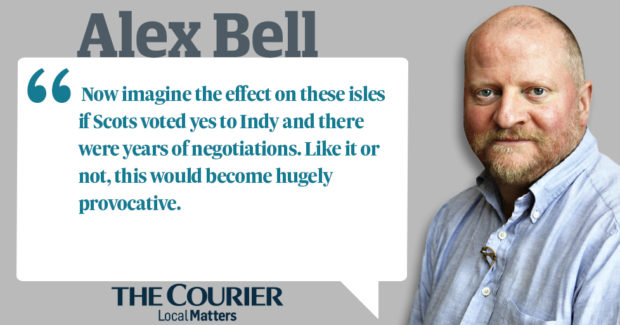The Banana Splits used to sing: “One banana, two bananas, three bananas, four”. The song came to mind on hearing John Major’s suggestion of two referenda to settle the Indy question.
Let there be many bananas.
The former Prime Minister’s idea shows people in the English establishment are thinking about Scotland. That is a corrective to the spin of Downing Street, which would have us believe the matter is closed.
Major is admitting the successive polls showing a majority for independence count. They are important. Dismissing them as the froth of politics is foolish and anti-democratic. Much as just saying no to indy, should the SNP win the next Holyrood election, would also be a grave error in a democracy – Trumpian, even.
Nationalist hyperbole about Scotland being a colony ruled by England is rot but it could become true if the will of the people is ignored. Democratic legitimacy is not something to treat casually.
We have been here before. The mid-1990s saw referendum inflation. At one point three were proposed to decide the devolution question. What mattered about this footnote to our nation’s history is that it showed the Labour Party, once half-hearted about a Scottish Parliament, was taking the idea seriously.
Major’s plan isn’t new. The idea of a referendum to test a principle followed by a confirmatory one on the details is familiar in democratic theory.
Whether it’s a good idea is another matter. The example of Brexit is cited in its favour. People who voted on a vast range of notions about what UK “independence” would mean are discovering it can have only one definition, as decided by the government of the day.
It will be defined by the exit deal with the EU, trade deals with the US and rogue factors like the pandemic. What was promised in 2016 will have evolved into something different by January 1.
Major, against the idea and reality of Brexit, thinks it amounts to a big mistake and has the feeling that if the UK were asked to vote on the matter again, would chose to stay in the EU.
He also thinks Scots might vote for the idea of independence but on seeing the reality, would reject it. The two referenda idea allows voters to measure promise against reality and also change their minds.
For this reason the SNP treat it like a wooden horse at the gates of Troy – a dastardly trick to cheat Scotland of its destiny, blah blah blah…
This is wrong. They should listen to all ideas. It’s good politics to be the topic of the national conversation. John Major has given independence a boost, even if the Nats distrust his motives. Let there be many bananas.
But the policy is a bad one. Imagine if the UK were to have a second vote on Brexit. It would be coming up soon. As a nation, the pandemic would be drowned out as the arguments were rehashed. We’d be in electoral mode right now.
For those who voted to leave in 2016, it would appear like a betrayal. Their wish sabotaged by an establishment which cannot just get on with things.
Remainers would have to campaign against not just the government of the day but the competence of the nation to negotiate a good deal. It would create an even more toxic and divided state.
As to the idea that we would all scrutinise the detail and reach a fair judgment, that’s total bananas. When did anyone ever vote on the small print?
Now imagine the effect if Scots voted yes to independence and there were years of negotiations. Like it or not, this would become hugely provocative.
Scots would resent London assessments of Scotland, the English would be easily whipped up into anti-Scottish fury, the Northern Irish would be forced into an existential crisis.
And after all that, if the Scots reject the independence deal in the second referendum? All the kings horses couldn’t put the UK together again.
Which makes the two referenda idea the Humpty Dumpty option. The truth is you either commit to fundamental change or you don’t. In theory you can change your mind, or see things differently to the spin, but in reality you can’t reject a union, spend four years negotiating out of a union and then decide to stay in the union.
Major and unionists would be far better engaging with the idea of independence now, before any vote. They could set up a constitutional convention which examined it as an option, inviting Scots of all political loyalties on board.
If they think the idea flawed, they be much better trying to kill Indy with kindness and co-operation than by multiple referenda.
